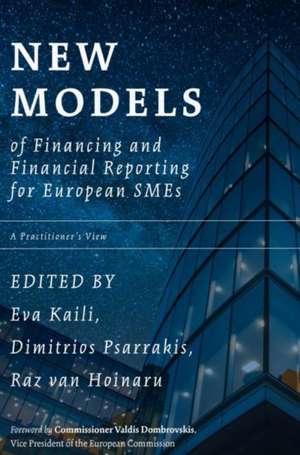New Models of Financing and Financial Reporting for European SMEs: A Practitioner's View
Editat de Eva Kaili, Dimitrios Psarrakis, Raz van Hoinaruen Limba Engleză Hardback – 15 mar 2019
This book looks at the 23 million registered Small and Medium Enterprises (SMEs) that make up 98 per cent of the EU economy. Addressing the high end of SMEs in terms of new models for SME funding and financial reporting, this merged way of looking at SMEs reveals a ‘myopic’ thinking in terms of net present value and (future) cash flows generating short-termism and low risk appetite for business. This is not an accounting issue, but rather a preference toward certain financial tools. A segment of SMEs, the ones that seek new ways of funding possibilities, as well as modern technologies (MTFs listing, blockchain, ICOs, etc.) do require, even without knowing, IFRS for SMEs. This book reveals how market conditions impact the financial performance and sustainability of SMEs and also generate innovative policy interventions and financing strategies for SME integrity and efficiency. The authors frame their arguments in the context of the Capital Markets Union, looking at the Innovation Triangle, SME growth ecosystem and business models. They conclude by advocating for closing the circle of financing and financial reporting for SMEs, while considering if new financial models of financing and financial reporting are good for all the SMEs or only for some.
The economy is being shaped by new models of financing and financial reporting. Read this practitioners’ view to understand the current changes and challenges.
Preț: 389.70 lei
Nou
Puncte Express: 585
Preț estimativ în valută:
74.57€ • 77.86$ • 61.72£
74.57€ • 77.86$ • 61.72£
Carte disponibilă
Livrare economică 15-29 martie
Preluare comenzi: 021 569.72.76
Specificații
ISBN-13: 9783030028305
ISBN-10: 3030028305
Pagini: 182
Ilustrații: XXXVI, 179 p. 4 illus.
Dimensiuni: 155 x 235 x 19 mm
Greutate: 0.45 kg
Ediția:1st ed. 2019
Editura: Springer International Publishing
Colecția Palgrave Macmillan
Locul publicării:Cham, Switzerland
ISBN-10: 3030028305
Pagini: 182
Ilustrații: XXXVI, 179 p. 4 illus.
Dimensiuni: 155 x 235 x 19 mm
Greutate: 0.45 kg
Ediția:1st ed. 2019
Editura: Springer International Publishing
Colecția Palgrave Macmillan
Locul publicării:Cham, Switzerland
Cuprins
1. The SMEs Literature Review: Perspective of Studies.- Part I: Financing.- 2. The Role of the State in the Innovation Triangle: Law and Policy Fostering the Optimal Regulatory, Business and Innovation Policy Environment.- 3. Catalysing the SME Growth Ecosystem in the New Information Age.- 4. Financing SMEs in the EU: Challenges and Opportunities.- 5. Financing Models for SMEs in the Age of Disintermediation.- 6. Funding Innovation in the Era of Weak Financial Intermediation: Crowdfunding and ICOs for SMEs in the Context of the Capital Markets Union.- Part II Financial Reporting.- 7. Towards Business Model Reporting for SMEs.- 8. New Relevance of Accounting and Reporting: SMEs, Ethics and Sustainability.- 9. Financial Reporting for Small Listed Companies.- 10. Financial Reporting by Quoted SMEs.- 11. The IFRS for Small and Medium-Sized Entities.- 12. Conclusion: Closing the Circle of Financing and Financial Reporting for SMEs. Our Formula.
Notă biografică
Eva Kaili is a Member of the European Parliament, elected in 2014. In her capacity as the Chair of the European Parliament's Science and Technology Options Assessment body (STOA), she has worked intensively on promoting innovation as a driving force of the establishment of the European Digital Single Market. She has been particularly active in the fields of blockchain technology, m/eHealth, big data, FinTech, AI and cybersecurity.
Dimitrios Psarrakis is Advisor of Economic and Monetary Policy at the European Parliament. He works mainly on files related to the Capital Markets Union, FinTech, and Financial Innovation. Prior to his work in the European Parliament he worked as credit risk specialist in the banking sector and advised the Greek Parliament during the years of the Greek debt crisis.
Raz van Hoinaru is part of the IFRS Permanent Team of the European Parliament. His work has spanned across public affairs agencies, government bodies, private companies, lobby and Parliament in-house policy development and advocacy. He has also taught classes at Queen Mary, University of London.
Textul de pe ultima copertă
This book looks at the 23 million registered Small and Medium Enterprises (SMEs) that make up 98 per cent of the EU economy. Addressing the high end of SMEs in terms of new models for SME funding and financial reporting, this merged way of looking at SMEs reveals a ‘myopic’ thinking in terms of net present value and (future) cash flows generating short-termism and low risk appetite for business. This is not an accounting issue, but rather a preference toward certain financial tools. A segment of SMEs, the ones that seek new ways of funding possibilities, as well as modern technologies (MTFs listing, blockchain, ICOs, etc.) do require, even without knowing, IFRS for SMEs. This book reveals how market conditions impact the financial performance and sustainability of SMEs and also generate innovative policy interventions and financing strategies for SME integrity and efficiency. The authors frame their arguments in the context of the Capital Markets Union, looking at the Innovation Triangle, SME growth ecosystem and business models. They conclude by advocating for closing the circle of financing and financial reporting for SMEs, while considering if new financial models of financing and financial reporting are good for all the SMEs or only for some.
The economy is being shaped by new models of financing and financial reporting. Read this practitioners’ view to understand the current changes and challenges.
Caracteristici
Gathers content in finance, economics, accounting and regulation by 13 top professional business and policy makers Unifies two sectors, state and private, and their stance towards SMEs Looks at the International Financial Reporting Standards (IFRS) for SMEs and how the SMEs report in a new financial environment Explains the EU approach in crowdfunding and ICOs in the context of the Commission's Fintech Task Force Argues that governments in Europe should start to more actively support certain method of financing rather than others
